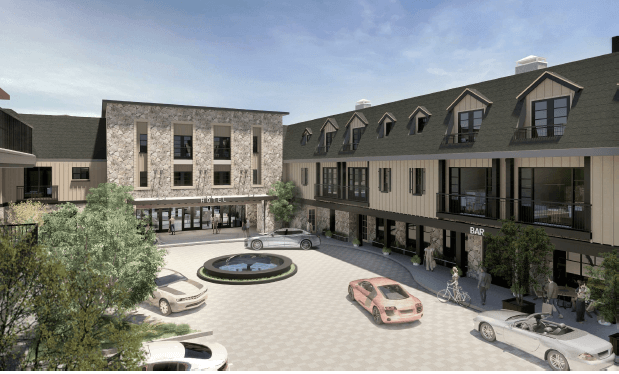That is the question coming before Sonoma’s City Council on December 6 on an appeal by Kenwood Development over its planned hotel on West Napa Street.
At issue is not the Planning Commission’s approval of the hotel itself, but the commission’s requirement that Kenwood pay $2.2 million into the city’s Affordable Housing Trust Fund. The money in that fund is used to facilitate the creation of Affordable Housing.
Claiming that paying the money into the fund over five annual payments once the hotel is up and running threatens the feasibility of the project, Kenwood is hoping that the City Council will let them off the hook. We don’t think it should.
If there is any issue that’s garnered widespread support in our community, it’s the need for additional housing, particularly housing for the lower wage workers of Sonoma. Beefing up the revenues of the Affordable Housing Trust Fund is a key component of helping that happen. Unless the City of Sonoma has money to contribute to projects, nonprofit Affordable Housing developers will build elsewhere; it’s just that simple.
When MacArthur Place Hotel applied to build an additional eleven rooms, the Planning Commission insisted on a payment to the fund of $1.1 million over five years as an alternative to building the housing required by Sonoma’s Development Code. That decision was not appealed, and construction is well underway.
Housing creation needs to be a standard practice of commercial development in Sonoma, and the city’s recently State-certified Housing Element supports that goal with policies and regulations intended to do just that. With the passage of recent State legislation, the inclusion of housing on commercial parcels is now allowed by right; in Sonoma, it’s a requirement on parcels over one-half acre. The payment of an in-lieu fee of $100 per-square-foot, rather than building housing on site, is the only alternative.
Kenwood’s hotel application was submitted under an older version of the city’s development code before the in-lieu fee was established, but even that version required housing to be built unless a waiver was granted. A waiver on housing was never guaranteed.
We find it hard to imagine how the required fee of $2.2 million threatens a project that is likely to cost upwards of $65 million; Kenwood will have to share the details of its pro forma financial projections to make that case. Kenwood says the hotel will generate $1.5 million in guest-paid TOT annually; if so, it will produce almost $12 million-a-year in gross room revenue alone.
Unless the City of Sonoma gets firm about enforcing its Affordable Housing policies, sufficient housing will never get built. Commercial development needs to be balanced with the need for housing it creates.
Hotels, in particular, employ many lower-wage workers: housekeepers, parking attendants, kitchen staff, wait staff, groundskeepers, and others comprise the majority of hotel employees. These are the people with the greatest housing challenge in this area, and why it is critical to satisfy the city’s housing policies.
The issue before the council is not whether or not a hotel is approved, but whether the project should be required to help finance new affordable housing. Because it’s the proper ethical, legal, and equitable choice, we think it should. The City Council should deny Kenwood’s appeal.






This piece leaves out that hotel workers will in all likelihood be union, which is a major socio-econ sustainability perk of this project and will offset any waiver of housing fees by allowing workers to earn enough to live here. The TOT paid by the hotel will fill the housing coffers soon enough. After 10 years of stalling, the applicant deserves a break. The project is a net win for the City, and for workers, housing fee or not.
What Fred states may or may not be true. The words “in all likelihood” say it all. There is no legal or binding agreement that a union will be in place when the hotel opens or ever. If these were union jobs, workers from other non union hotels would then apply to work here. Their former jobs will be filled with non union workers. And then all the workers will need housing they can afford. There is also no legal or binding agreement that the developer, Kenwood Investments/ Darius Anderson will not sell the rights to the project, after the council gives them what they want. Money rules and there will be little or no affordable housing as a result of this project. Our city council is dazzled by the dollars.
According to my reputable union sources close to the project, there is a durable union agreement between the union and developer and this goes with the project even if it’s sold. Yet Josette says: “There is no legal or binding agreement…” How does she know what is between the union and the developer? No, all she has is rumors. This union deal is a great benefit that stands to tip many SV hotels to go union. It is a major oversight by the editorial to leave this out. New paragraph:
The Council did a fine deliberation on 12/6/23 and reached a reasonable place. It’s interesting to see many who usually have nothing to say about housing, and who do not care to show up at any housing issue items, all of a sudden be housing advocates when it suits their anti-hotel views.
The fact is I actually care that housing is built for those that need it, at a price they can afford. I do not care about more market rate housing being built because” market rate” is beyond the reach of those who work here. What I advocate for are project ideas like the Next 100 Years plan for SDC. Where adaptive reuse of existing buildings would provide low cost housing for those who need it. You say you advocate for low income housing, but it seems more like advocating for the wealthy to make more money while building more high end stuff that will be second homes. Just think, if instead of a give away to Kenwood investments, the city bought some land, put a bunch of state of the art, “green construction” modular or prefabs on it and sold or rented it to local workers only, at 1/4 their income (under a local trust or district) how much farther that would go to providing affordable housing. So no I do not care to show up for more of the same old “trickle down” thinking. Time for a change, you can’t keep doing the same thing and expect a different result.